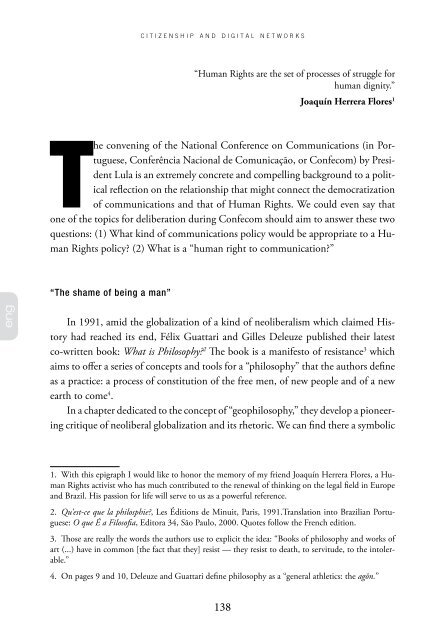Sergio Amadeu da Silveira - Cidadania e Redes Digitais
Sergio Amadeu da Silveira - Cidadania e Redes Digitais
Sergio Amadeu da Silveira - Cidadania e Redes Digitais
You also want an ePaper? Increase the reach of your titles
YUMPU automatically turns print PDFs into web optimized ePapers that Google loves.
eng<br />
c i t i z e n s h i p a n d d i g i t a l n e t w o r k s<br />
“Human Rights are the set of processes of struggle for<br />
human dignity.”<br />
138<br />
Joaquín Herrera Flores 1<br />
The convening of the National Conference on Communications (in Portuguese,<br />
Conferência Nacional de Comunicação, or Confecom) by President<br />
Lula is an extremely concrete and compelling background to a political<br />
reflection on the relationship that might connect the democratization<br />
of communications and that of Human Rights. We could even say that<br />
one of the topics for deliberation during Confecom should aim to answer these two<br />
questions: (1) What kind of communications policy would be appropriate to a Human<br />
Rights policy? (2) What is a “human right to communication?”<br />
“The shame of being a man”<br />
In 1991, amid the globalization of a kind of neoliberalism which claimed History<br />
had reached its end, Félix Guattari and Gilles Deleuze published their latest<br />
co-written book: What is Philosophy? 2 The book is a manifesto of resistance 3 which<br />
aims to offer a series of concepts and tools for a “philosophy” that the authors define<br />
as a practice: a process of constitution of the free men, of new people and of a new<br />
earth to come 4 .<br />
In a chapter dedicated to the concept of “geophilosophy,” they develop a pioneering<br />
critique of neoliberal globalization and its rhetoric. We can find there a symbolic<br />
1. With this epigraph I would like to honor the memory of my friend Joaquín Herrera Flores, a Human<br />
Rights activist who has much contributed to the renewal of thinking on the legal field in Europe<br />
and Brazil. His passion for life will serve to us as a powerful reference.<br />
2. Qu’est-ce que la philosphie?, Les Éditions de Minuit, Paris, 1991.Translation into Brazilian Portuguese:<br />
O que É a Filosofia, Editora 34, São Paulo, 2000. Quotes follow the French edition.<br />
3. Those are really the words the authors use to explicit the idea: “Books of philosophy and works of<br />
art (...) have in common [the fact that they] resist — they resist to death, to servitude, to the intolerable.”<br />
4. On pages 9 and 10, Deleuze and Guattari define philosophy as a “general athletics: the agôn.”


